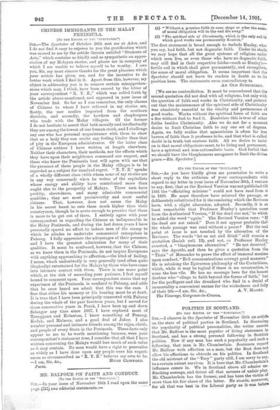(TO THE EDITOR OF THE "SPECTATOR.")
Si,—As you have kindly given me permission to write a short reply to the criticism of your correspondents with regard to my letter in your issue of November 30th, I venture to say, first, that as the Revised Version was not published till 1881 the "officiating minister" could not have read from it in 1860. He must therefore have misread the passage, or deliberately substituted for it the rendering which the Revisers have, with a slight alteration, adopted. Secondly, it is at least remarkable that Professor Huxley's quotation came from the Authorised Version, "If the dead rise not," to which he added the word "again." The Revised Version runs: "If the dead are not raised." Does it not appear probable that the whole passage was read without a pause ? But the real point at issue is not touched by the alteration of the Revisers. The words "let us eat and drink" still remain a quotation (Isaiah xxii. 13), And not, as Professor Huxley asserted, a "blasphemous alternative." "Be not deceived," says the Apostle, and then he gives a quotation from the " Thais " of Menander to prove the effect of immoral maxims upon conduct, "Evil communications corrupt good manners." He is rebuking the Epicurean philosophy of the Corinthians, which, while it may be logical if there is no resurrection, is none the less vile. He has no message here for the honest doubter who "clings to faith beyond the forms of faith," but for the profligate and the drunkard who find in a denial of immortality a convenient excuse for the wickedness and folly of their life.—I am, Sir, &c., A. V. MAGEE. The Vicarage, Gargrave-in-Craven.














































 Previous page
Previous page